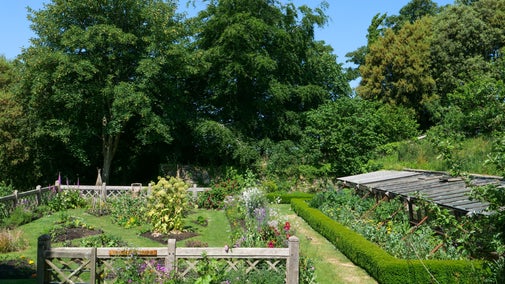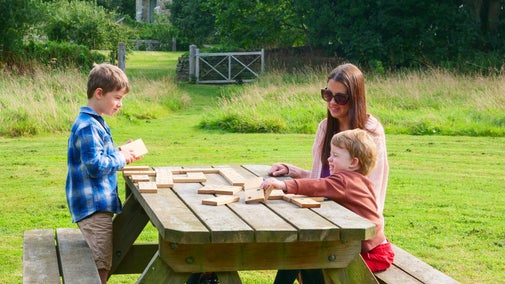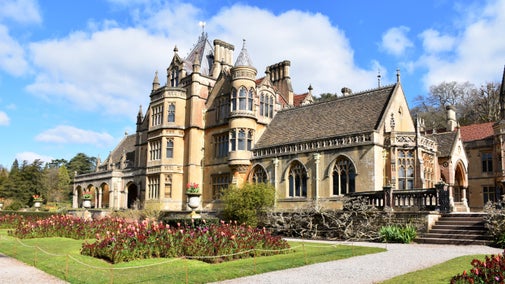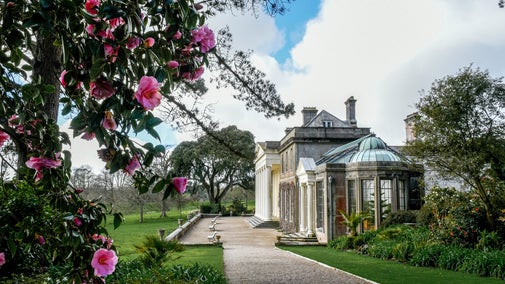
Trerice's collections
Explore the objects and works of art we care for at Trerice on the National Trust Collections website.

Explore inside Trerice and experience life in an Elizabethan manor house. Wander through the rooms and discover the decorative plasterwork in the Great Hall and Great Chamber, pay close attention to the ceiling which inspired the knot garden and the overmantel where an endearing mistake can be found.
This impressive table was made for the Great Hall in situ with timber from the Holnicote estate in Somerset which the Acland family also owned at that time. It was probably installed after restoration of the Hall by Sir Thomas Dyke Acland circa 1840. The very fact that the table cannot be taken out of the Great Hall now means it is the only item of furniture that has always belonged to Trerice.
A set of nine wooden kayles, traditional Cornish skittles, with iron bases and cheese (ball) made in the late 16th century. You can have a go playing kayles on the kayling lawn in the garden with a replica set.
Of the 17 clocks on display in the house the Tompion, found in the Great Hall, is the oldest. An eight-day-striking longcase clock by Thomas Tompion c. 1680. It has a two train, five pillar movement with anchor escapement.
The 10 inch square dial has winged cherub spandrels, a silvered chapter ring and a square calendar aperture in the matted dial centre. The case is walnut veneered onto oak. It has a flat top rising hood with barley twist columns and glazed sides. The third scape and warning wheels are later replacements as probably are the shutters and ebonised bun feet.

The window in the Great Hall is a key feature of the room holding 576 tiles of 16th- to 19th-century glass. Due to the size, it would have been a grand statement of wealth when first built. Historic graffiti has been found scratched onto some of the tiles of glass.

A slight mistake in the plasterwork upstairs in the Great Chamber can be spotted in the overmantel. It seems that as the maker reached the end of the date in roman numerals they ran out of space and switched simply to the English numeral ‘3’.
Look out of the Great Chamber window for views of the Knot Garden as it changes throughout the seasons and towards St Newlyn East Church through the ever-changing Cornish weather.
Cornish painter John Opie was born 15 miles away at Trevellas, near St Agnes. Dubbed ‘The Cornish Wonder’ he was known for his historical paintings and society portraits. His subjects included Lord Nelson, Lady Hamilton, Sir Joshua Reynolds, Dr Johnson and Mary Wollstonecraft as well as many of the Cornish gentry.
Opie became a full member of the Royal Academy in 1788 and was elected Professor of Painting in 1805. At Trerice there are five Opie paintings on display in the house. These include a self-portrait and a portrait of Dolly Pentreath who was reportedly the last native speaker of the Cornish language.

The English oak four poster Tudor bed was gifted to Trerice in the 1980s and is now a key feature in the Great Chamber. It wasn’t until early 2023 that the bed first came to Trerice, after having been loaned to East Riddlesden Hall in West Yorkshire. The bed arrived dismantled, with 21 numbered parts to piece together.
On rebuilding the bed, the conservation team found several carvings of initials on the back of the bed head, perhaps belonging to craftsmen. Look out for detailed original carvings on the head as well as the ‘tester’, or upper rectangular panel, that date back to 1600, including angels and feathery wings. Natural hemp rope has now also been threaded and criss-crossed through the frame to replicate rope that would have originally been used to support a mattress.

Explore the objects and works of art we care for at Trerice on the National Trust Collections website.

Explore an Elizabethan-inspired knot garden and an orchard full of Cornish apple varieties. It’s a great place to spot wildlife.

Find out which families inherited and lived at Trerice. Discover how money was gained through the Royal Court and who were absent landlords.

Discover what family-friendly activities are on offer at Trerice. Try a game of Cornish kayles, spot the mice around the house and try on Tudor-inspired costumes in the hayloft.

Historic buildings are a treasure trove of stories, art and collections. Learn more about their past and plan your next visit.

Discover a vast range of houses and buildings to visit in Cornwall. From a Victorian mansion and Tudor homes to heritage mining buildings and lesser-known gems.